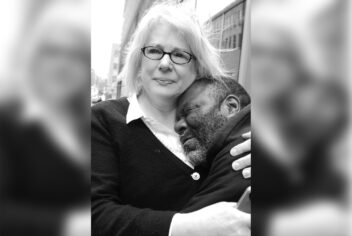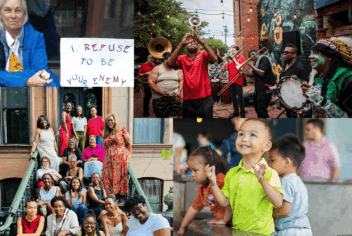A well-qualified applicant applies for a job at a nonprofit and lands an in-person interview. The applicant explains that their service dog will accompany them. The hiring manager is left with questions: Does the manager have to agree? Does this entail agreeing to permit the service dog in the workplace if the applicant is hired? Can the manager ask the applicant about the service dog in the interview? The manager just doesn’t know how to handle the situation, reasoning that avoidance is the least risky approach.
The applicant gets a lukewarm interview while the hiring manager stares uncomfortably at the service dog. The candidate with the service dog is deemed “not a good fit.”
Or, the interview is canceled. A different applicant receives a job offer. The hiring manager doesn’t believe the approach is discriminatory. But this dynamic clearly contributes to barriers to employment for individuals with disabilities.
A Critical Aspect of Equity
A 2017 study shows that when three applicants with identical qualifications applied for the same job, the applicants who disclosed a disability were 26% less likely to receive interest from employers.[1] In addition, data suggests that applicants with physical disabilities tend to receive higher ratings than similarly-qualified applicants with cognitive or emotional disabilities.[2]
When an applicant has a disability, hiring managers are afraid to say or do the wrong thing and expose the nonprofit to liability. Everyone’s afraid of getting sued. And while no one really wants to admit it, many people are still very uncomfortable talking about disabilities. By learning more about how to navigate disability issues in the hiring process, nonprofits will reduce their risk and open their hiring pool to well-qualified candidates who are often overlooked.
A Level Playing Field
In addition to being a critical aspect of equity (and haven’t we all been working on equity lately?), making accommodations for applicants with disabilities is required under the Americans with Disabilities Act (ADA).[3] Many state laws also protect applicants from discrimination based on disability and may have a lower employee threshold.[4] The ADA, which covers employers with 15 or more employees, requires that employers make reasonable accommodations for applicants or employees unless it would cause an undue hardship. These protections extend to not just responding to individual requests for accommodations, but also to structuring a hiring process in which qualification standards don’t negatively impact individuals with disabilities. So, a better-to-do-nothing approach actually increases an employer’s liability.
Almost always, a little flexibility is all that is necessary. There’s a difference between treating every applicant the same (meaning precisely identical circumstances) and offering a level playing field for evaluating applicants. The conditions of an interview can change without negatively impacting the nonprofit’s ability to evaluate all applicants fairly. Just like moving an in-person interview to an accessible location will not impact the interviewers’ ability to assess the applicant fairly, a service animal in the room will not impact the assessment of skills, experience, and education.
Tips on Handling Accommodation Requests During the Hiring Process
Nonprofits can boost their confidence in handling accommodation requests during the hiring process by following a few simple steps:
- Unless the request is wildly onerous, do your best to accommodate it. An applicant who is immunocompromised may request a virtual interview, and someone with limited mobility may need to meet close to the building entrance. Someone with anxiety may need to take a break or simply to have the interviewers advised that their evaluation of the applicant’s competency should not be affected by signs of nervousness. Making such accommodations may mean making an exception to written policies or to long-standing practices. If you truly cannot make the requested accommodation, ask the applicant if other accommodations would work instead of just saying no.
- It’s best to have someone other than the hiring manager handle any accommodation issues. For example, if your nonprofit has a human resources manager, that person should be the contact for managing accommodation issues, leaving the hiring manager to focus just on the applicant’s qualifications. In a nonprofit without a dedicated human resources function, the accommodation may be managed by the executive director. Keep the explanation about the circumstances as simple as possible, with the applicant’s privacy in mind. The person or group that is interviewing the applicant doesn’t need to know the details about the disability.
- Don’t ask questions during the interview about the accommodation or any perceived limitations. If the applicant brings up accommodations they would need as an employee, do not discuss the details of how accommodations would work. The inquiry should be limited to whether the applicant can perform the job, with or without accommodation.[5] Keep the focus on determining who is best qualified for the position based on their skills and experience. Defer any discussion of accommodations on the job until after the applicant has accepted an offer. The interview stage is not the right place to work out those details.
- Employers may ask whether applicants need accommodation, so long as they’re asking all the applicants the same question. One way to put this inquiry is, “Can you perform the essential functions of this job with or without accommodation?” That’s sort of an awkward sentence, which is why it fits better as a yes/no question in the initial application. Never ask a question like this only to the applicant(s) who you think might be disabled (there’s a lawsuit for that). It’s perfectly appropriate to put the physical requirements of a job in the description and advertisement for the position and just leave it at that.
- If you decide not to hire an applicant who requested an accommodation or disclosed a disability, make sure to document and supported the decision with objective business reasons. If the applicant pool is similar in terms of qualifications, then it’s even more important to set out objective, business-related reasons why a particular applicant received an offer, and to document these at the time the decision is made. Beware the overused phrase “not a good fit.” Managers love to say that someone is “not a good fit” because it’s so general, it could mean anything. But that’s the problem — it’s really doesn’t mean anything. It comes across as an excuse. If you’re a well-qualified applicant who happens to have a disability, and you got as far as the interview stage, imagine being told you’re “not a good fit.” That can sound an awful lot like, “We don’t employ people with disabilities here.” Be ready to explain hiring decisions using objective, specific reasons that are related to the job.
Health and Safety Issues and COVID-19
Employers do not have to make accommodations that would present a direct threat to the safety of their staff, clients, or to the individual requesting the accommodation. This is a well-settled area of law —the most important case on this issue is now almost 20 years old.
When Mario Echazabal applied to work at an oil refinery plant owned by Chevron, the pre-employment medical screening revealed a liver condition that would have been exacerbated by the working environment.
Chevron took the position that chemicals at the refinery would pose a threat to Echazabal’s health and declined to hire him. The ensuing lawsuit wound all the way to the U.S. Supreme Court.[6] In its decision, the court sided with Chevron, relying on a provision of the ADA that permits job-related qualifications, consistent with business necessity, that protect the health and safety of the applicant or employee.[7]
Because the chemicals at the refinery posed a direct threat to Echazabal’s health and safety, Chevron had not violated the ADA by refusing to hire him. Although oil refineries aren’t a typical workplace for nonprofits, questions of safety and disability surged during the pandemic.
Most recently, the question of what constitutes a direct threat is coming up in the context of employer policies on vaccinations for COVID-19. A mandatory vaccination policy is a qualification that must be job-related and consistent with business necessity.[8]
Many employers, particularly in healthcare, are firing employees who refuse COVID-19 vaccinations, on the basis that their unvaccinated status present a direct threat to the health and safety of the employer’s staff and patients.[9]
Even if an employer has a mandatory vaccination policy, it’s still a bad idea to ask about vaccination status until after a job offer has been made. Medical inquiries should never be part of a hiring process, including asking about an applicant’s vaccination status.
The EEOC has indicated it views pre-offer questions about medical conditions as unlawful.[10] Employers who have adopted a mandatory vaccination policy may make that policy known, but any engagement with the applicant on their vaccination status should take place after an offer is made.
In today’s competitive market for workers, nonprofits need to cast as wide a net as possible for the most qualified employees. By having the confidence to handle requests for accommodation during the hiring process, nonprofits have the opportunity to hire great candidates who might otherwise be overlooked.
References
[1] Ameri, M., Schur, L., & Meera, A. (2015). The disability employment puzzle: A field experiment on employer hiring behavior (NBER Working Paper Series 21560)
[2] “Applicants with physical disabilities, as opposed to applicants with cognitive or emotional disabilities, are also rated as more desirable job applicants.’ (Combs & Omvig, 1986; Stone & Sawatzki, 1980) Patterns of Discrimination in Hiring Job Applicants With Disabilities: The Role of Disability Type, Job Complexity, and Public Contact by Gouvier, Sytsma-Jordan and Mayville, 2003
[3] “Discrimination is prohibited against a qualified individual with a disability in regard to a number of actions by an employer, including hiring.” 42 U.S.C.S. 12112(a) The ADA applies to employers of 15 or more. Consult an attorney for advice on what laws apply to your nonprofit.
[4] California’s Fair Employment and Housing Act, for example, applies to employers of 5 or more.
[5] “…an employer should assess the need for accommodations for the application process separately from those that may be needed to perform the job.” EEOC Enforcement Guidance on Reasonable Accommodation and Undue Hardship under the ADA” October 17, 2002
[6] Chevron U.S.A. v. Echazabal, 536 U.S. 73, 122 S. Ct. 2045 (2002)
[7] 42 U.S.C. 12113(b): Qualification standards. The term “qualification standards” may include a requirement that an individual shall not pose a direct threat to the health or safety of other individuals in the workplace. See also 42 U.S.C. § 12112(b); 29 C.F.R. §§ 1630.10, 1630.14(b)(3).
[8] In addition, employers with mandatory vaccination policies should have a process for requesting medical or religious exemptions.
[9] The direct threat analysis may also apply to requests for medical or religious exemptions from a mandatory vaccination policy. Due to the complex and evolving nature of these questions, nonprofits should consult with an attorney when handling requests for exemptions from a mandatory vaccination policy.
[10] “Under the law, an employer may not ask disability-related questions and may not conduct medical examinations until after it makes a conditional job offer to the applicant.” EEOC Guidance on Preemployment Disability-Related Questions and Medical Examinations. October 10, 1995 https://www.eeoc.gov/laws/guidance/enforcement-guidance-preemployment-disability-related-questions-and-medical See also 42 U.S.C. § 12112(d)(2); 29 C.F.R. §§ 1630.13(a), 1630.14(a),(b).





